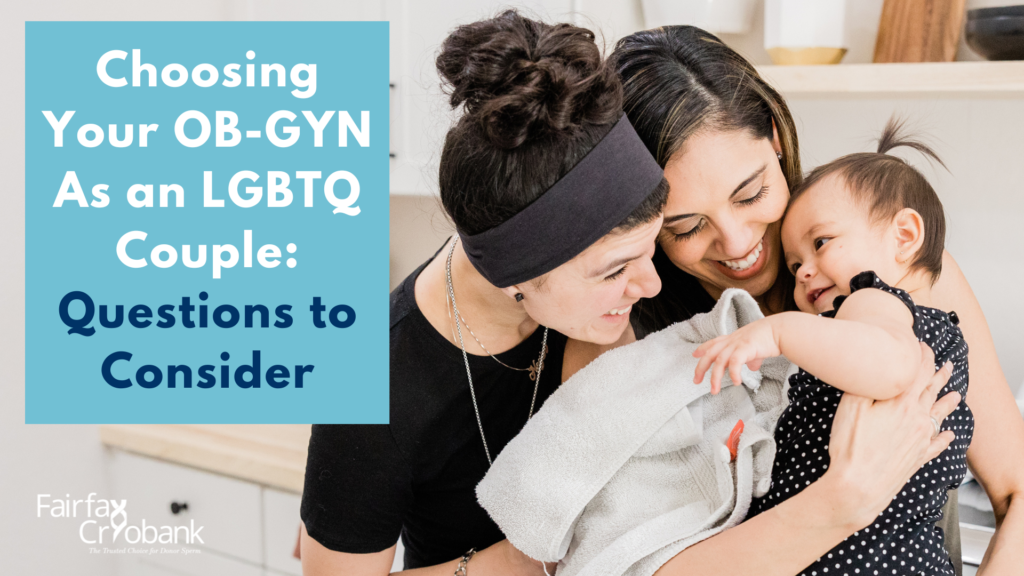CHOOSING AN OB-GYN AS AN LGBTQ COUPLE: QUESTIONS TO CONSIDER

Choosing an OB-GYN (Obstetrician-Gynecologist) is a big decision for any couple—it means you’re working toward trying to have a baby, which is a huge and beautiful milestone. Your lives as parents begin when you start trying to conceive together, and your doctor is part of the team that will help make it happen. Because there is the potential for challenges to arise in the fertility process, your doctor must be more than just an expert in their field.
You want them also to be compassionate and respectful and an excellent communicator with a bedside manner that feels comfortable to you and your partner. As an LBGTQ couple, it’s also vital that your OB-GYN supports and celebrates your family, and here are some questions you can ask yourself that will help you decide if this doctor is the right match for you.
1. Do They Use/Respect Your Use of Pronouns?
It’s always a great sign if your doctor introduces themselves with their personal pronouns, but you can offer yours to gauge their response if they don’t. If you’re comfortable, you can ask them directly if they have worked with LGBTQ families before — again, their tone and answer will probably be telling. If they are dismissive in any way, that’s a red flag.
2. Do they talk thoroughly and respectfully about your options?
Once you’ve seen some green flags, it’s time to ask specific questions about how the doctor handles the fertility, pregnancy, and delivery process. First, talk about options, as they are relevant to you and your partner’s wants and needs. Gestational carriers, reciprocal IVF (also called co-maternity), donor sperm, IVF, ICI, and IUI options for insemination are all things you may want to ask about. The doctor should also ask about your desires in terms of genetics: does the non-gestational partner have sperm or eggs they want to use? They should also walk you through the details and vial types needed for intravaginal, intracervical, and intrauterine insemination.
3. Do they make you feel comfortable with the process from start to finish?
Next, talk to the doctor about how your pregnancy appointments and delivery will go. You want to ensure the team you’re working with will enthusiastically welcome your partner at every visit and treat them as your child’s parent at the hospital or birthing center where you’ll deliver the baby. This is particularly important if you and your partner are not married and if you live in a less progressive state.
4. Do their experience and approach match your patient needs?
Ask about their experience with anything important to you and look for a doctor who listens and asks questions about what matters to you. They should also ask about your wants and needs in terms of the non-gestational partner’s participation in insemination, whether they want to be in the room or they would ideally want to be the one doing the insemination (which isn’t always possible for higher-intervention procedures, but should always be offered for intravaginal insemination, which can be done at home if the couple desires).
5. Do you feel comfortable asking about their allyship with the community?
Suppose you feel good about your rapport with the doctor. In that case, you can ask deeper questions, like what connections the practice has to the LGBTQ community and whether they have a bank of referrals to other services you might need, like family and medical attorneys, sperm banks, egg donors, and/or gestational carriers. This might all sound like a lot—and it is. Still, it’s best to prepare ahead of time rather than to learn later in the fertility and pregnancy process that your doctor is nominally inclusive but has no experience with or invests in LGBTQ families.
6. Do they feel like a part of your team?
It is of utmost importance that you and your partner feel fully seen, accepted, and supported by your OB-GYN. After all, they are the person who will help you conceive and deliver your baby—they may even be the first person to catch the baby when they are born! The relationship between your doctor during this time is an important one. Making sure you know they’re a part of your support system and have your best interests at heart will help make your journey to parenthood a little less stressful.
There are many doctors and practices out there, so if the vibe isn’t right, shop around until you find a doc that can provide you with the high-level medical advice you need, along with the identity-affirming care you deserve. Doctors can range from warm and fuzzy to brusque, and what bedside manner you prefer and how much it matters to you is a question of personal comfort, so go with your gut when deciding on a provider.
If you’re just beginning your journey, congratulations! Explore our blog page, learn about other LGBTQ Fairfax Family stories, and view our donors. If you have already started the adventure to parenthood and are ready to start selecting your sperm donor, get started here.







